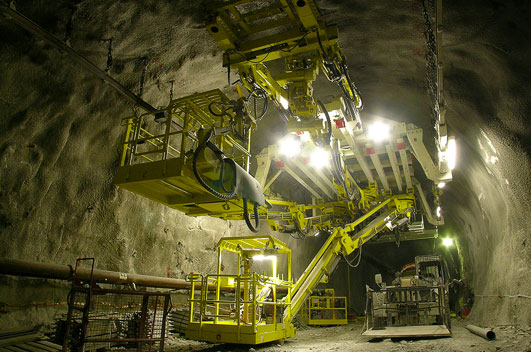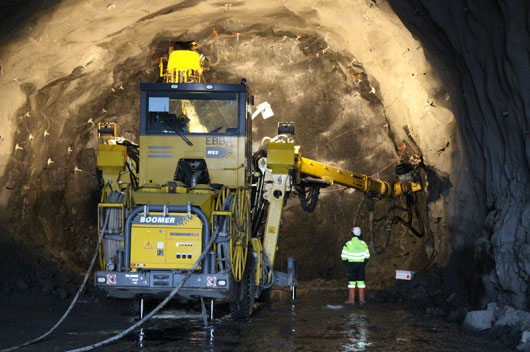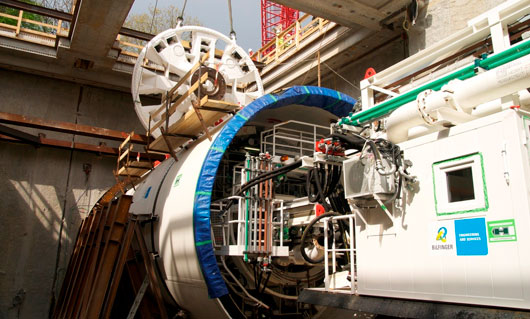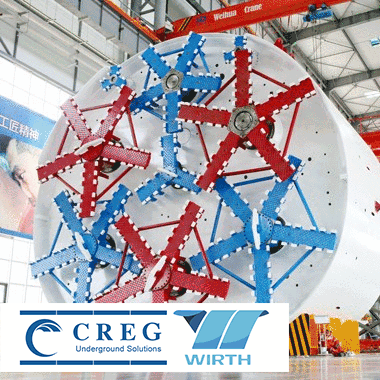COMPANY NEWS  to withdraw from civil tunnelling
5 June 2014
to withdraw from civil tunnelling
5 June 2014
 to withdraw from civil tunnelling
5 June 2014
to withdraw from civil tunnelling
5 June 2014
Peter Kenyon, TunnelTalk
-

Bilfinger is involved in Gotthard base tunnel construction
- Bilfinger SE (formerly Bilfinger Berger) announces intention to sell a major part of its civil engineering business and withdraw from all civil tunnelling and road and rail infrastructure activities.
- In a statement the multinational company, headquartered in Germany, confirmed: “Activities in the Construction business segment will be put up for sale. Bilfinger is intensifying its focus on its core business, which comprises engineering and services for industrial facilities, power plants and real estate. The engineering and services group therefore intends to part with significant portions of its civil engineering business which generated a (sales) volume of approximately €1 billion in 2013.”
- André Bense of Bilfinger SE told Tunneltalk: “The sale includes the tunnelling unit in its entirety. After the sale Bilfinger will not execute any more tunnelling projects. Those that are already under construction, and all future tunnelling activities, will be continued by the new owner. The synergies with the other Bilfinger business operations have gradually disappeared, most recently through the sale of Concessions. The remaining major project expertise [in tunnelling] alone is not reason enough to hang on to the activities.”
-

Excavation of the Vågstrand tunnel
- In addition to civil tunnelling, the speciality of formwork also sits within Bilfiger’s Construction segment. A buyer is currently being sought. Austrian tunnel construction specialist Porr is reportedly interested in acquiring some or all of Bilfiger’s divestments.
- “The selling process has just begun. There is already strong interest from potential buyers but we cannot go more into details at this early stage. Bilfinger will finish the selling process with help from Rothschild within a year. The selling process has no negative impact on the remaining operational business,” said Bense.
- Less than two months ago Bilfinger won a 60% share of a €230 million contract from Norwegian Highways authority Statens Vegvesen for construction of the Eiganes tunnel in Stavanger, Norway – one of three tunnels being excavated as part of the larger world record subsea Ryfast mega-project. The 5km twin tube toad tunnel will allow direct connection of the E39 to the subsea tunnels as well as providing relief to Stavanger’s congested city centre.
-

TBM excavation for U-Bahn link in Berlin
- The company has also recently completed drill+blast excavation of the 3.67km-long E136 Vågstrand tunnel (January 2014), also for Statens Vegvesen. It also holds the technically challenging US$1.7 billion tunnel contract for twin-running 6.5m diameter TBM excavation of a 1.6km underground connection between the U-Bann U5 and U55 lines in the German capital Berlin. Contract scope also includes construction of two new stations.
- In Düsseldorf, Bilfinger is carrying out complex 9.49m diameter TBM excavation of two sections of the Wehrhahn Line (1.3km and 900m), which will eventually serve to replace a number of above-ground tram connections and will significantly reduce the burden on traffic in the inner city when it goes into service in 2015.
- The company is also been involved in drill+blast excavations and TBM cavern construction of the Fréjus rescue tunnel between France and Italy, drill+blast excavations for the Citybanan Line in Stockholm, Sweden, and in construction of a difficult 6.5km-long core section of the overall 53km Gotthard base tunnel that is only accessible via an 800m deep vertical access shaft.
- The company is also in the final stages of delivering three rail tunnels for Deutsche Bahn, in joint venture, for the 100km stretch of high speed rail line between Ebensfeld and Erfurt in Germany. Contract scope includes the main 7.5km Silderberg tunnel, and the shorter tunnels of Brandkopf and Lohmeberg, mostly by drill+blast. The new line is expected to enter service between 2015 and 2017.
-

Site of deadly Cologne collapse
- Bilfinger Berger was famously involved, as consortium leader, in construction of the ill-fated underground Cologne tramway. In March 2009 the city’s historical archive building and a neighbouring aparment unit were reduced to a heap of rubble after a shaft collapsed, resulting in two deaths and the loss of precious archival documents.
- Currently Bilfinger’s operations are split across four segments – Industrial, Power, Building and Facility, and Construction. It intends to concentrate future activities on the first three core segments – which account for more than 85 per cent of its income - although says it will retain the offshore wind power grid construction and steel construction interests that currently sit within the overall Construction segment of the business.
-
- Net profit at Bilfinger has dropped sharply over the last three years, from €394 million in 2011 down to €276 million in 2012, and down further to €173 million last year (2013) – from annual revenues that have remained fairly constant at approximately €8.4 billion. Much of this downturn comes as a result of declining revenues from the Construction segment of the business (which covers road and rail infrastructure projects), where output volumes fell by 26% between 2012 and 2013, and the order backlog by 19% from €1.2 billion to €987 million. Margins in this segment have declined to just 0.1%, and the company does not envisage substantial change in this return over the coming year. These figures contrast sharply with the other three segments where margins are running at 5.9% (Industrial), 9.8% (Power) and 4.9% (Building and Facility) – with “substantial” prospects of further improvements. In 2013, adjusted earnings before interest, tax and amortization (EBITA, which serves as a benchmark for operating profit) revealed the extent of the problems in Bilfinger’s Construction segment (Table 1).
-
Table 1. EBITA by segment (€ millions) 2013 2012 Industrial 232 206 Power 123 123 Building and Facility 116 106 Construction 1 25 Consolidation, other -63 -73 Operating profit 409 387 - Last year Bilfinger sold its “heavy loss making” German road construction business in a bid to improve the performance of the Construction segment and the company as a whole. Chairman Roland Koch said in the company’s 2013 Annual Review: “Burdens from the German road construction unit and from the construction business in Poland shaped the Construction business segment and prevented a better performance from the Group as a whole.” He claimed the sale of the road construction unit and realignment of operations in Poland would “solve these problems”, but it now appears that they have not.
-
Awards made on record-breaking Ryfast project – TunnelTalk, May 2013
Citybanan starts complex sinking operation – TunnelTalk, May 2013
Final finish for Gotthard Baseline excavation – TunnelTalk, March 2011
Fatal collapse on Cologne’s new metro line – TunnelTalk, March 2009
Ebensfeld-Erfurt high speed rail line – TunnelTalk, May 2009
|
|
|
|
|
Add your comment
- Thank you for taking the time to share your thoughts and comments. You share in the wider tunnelling community, so please keep your comments smart and civil. Don't attack other readers personally, and keep your language professional.

